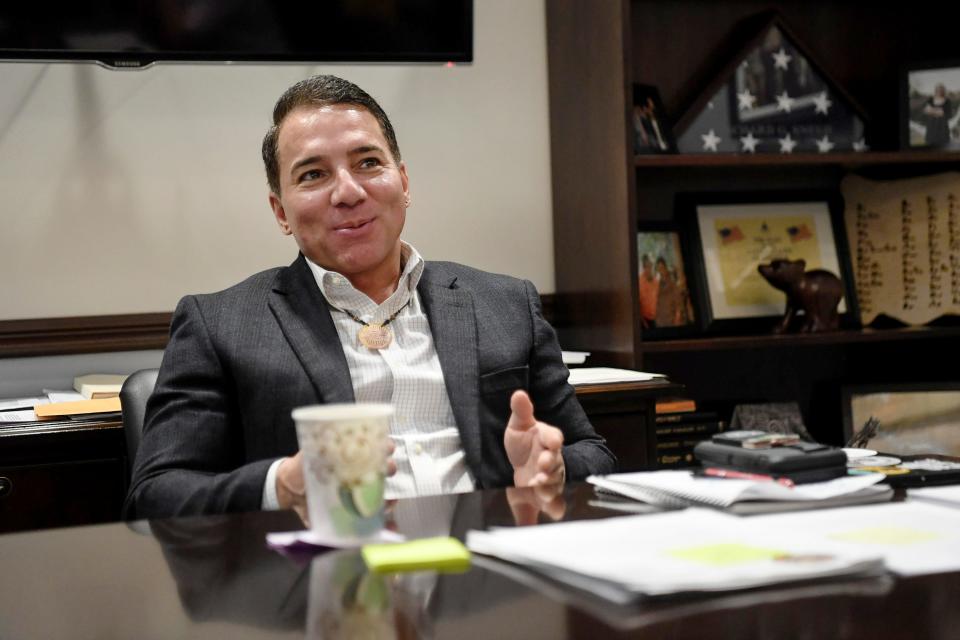Marijuana and the resurgence of a Cherokee chief in the mountains of North Carolina

A small election among a people who were once almost erased from history is now making history.
A Sept. 7 vote by the Eastern Band of Cherokee to legalize recreational marijuana within the boundaries of their Western North Carolina territory has drawn widespread interest, and in some cases, ire.
And while the planned legalization of cannabis in a state where it's not legal was the headline, history was also made by the resurgence of a former Cherokee leader. Elected to chief was Michell Hicks, who held that position for three terms, a period of expansion in the tribe's gambling business. Hicks chose not to run again in 2015.
In this month's election, Hicks took 65% of the vote, beating incumbent Chief Richard Sneed, 2,254 to 1,212.
Recreational cannabis, meanwhile, passed by a landslide 70% of the vote, 2,464 to 1,057. But it's difficult to draw a relationship between the two races.
Some of the loudest criticism of cannabis came from the region's Republican congressman, Chuck Edwards, who has introduced a bill to cut federal highway funds if the tribe moves ahead with legalization.
Neither of the chief candidates opposed what they termed "adult use."
"While this election may be remembered as the one that unseated Sneed and allowed for adult cannabis use, one did not cause the other," said Western Carolina University political science professor Chris Cooper.
The Citizen Times reached out Sept. 11 to Hicks and Sneed.

Sneed vetoed a Tribal Council budget bill allocating $64 million to the dispensary for medical marijuana, a program the Cherokee are now on the verge of starting with distribution of cards for qualifying patients. But he made clear he supported "cannabis for medical and adult use."
Hicks in this race did not campaign on the cannabis issue. But near the end of his third term he directed the Cherokees' attorney general to study the issue of legalization after the federal government lifted restrictions for tribes.
Sneed did face criticism for high spending on programs he said would diversify the tribe's economy from gambling. Hicks also came with a record, Cooper said. That included growth in tribal income, but also findings he made personal charges to a tribal credit card.
"So it’s not as simple as a challenger vs. an incumbent; it’s almost as if there are two incumbents running. The voters know, in general, what a Hicks and a Sneed administration looks like," the political science professor said.
For legalization to take effect, the referendum must now be followed by Tribal Council legislation.
Taking advantage of legal loopholes has turned into a winning strategy for the Eastern Band ― descendants of a small group of Cherokee who escaped the infamous Trail of Tears relocation to the west. Starting in 1997, the tribe opened one, then two casinos, bringing marked changes to an area that struggled with poverty.
Harrah's Cherokee Valley River Casino in Murphy started operations at the end of Hick's last term. Six years later competition began in earnest with the opening of the Catawba tribe's Two Kings Casino in Kings Mountain, two and a half hours to the east.
Now, with state lawmakers considering allowing four more casinos, Cherokee leaders such as Hicks are emphasizing the need to pursue "nongaming" revenues. That means supporting both local businesses and outside investment, Hicks said in a candidate survey by the Cherokee One Feather, the tribe's official newspaper.
"We recognize that Cherokee has a lot to offer beyond gaming, and we are committed to showcasing the rich cultural heritage and natural beauty of our community," he said.
More: Legal marijuana in NC? Cooper, Stein urge lawmakers to decriminalize cannabis
Parents still purchase CBD for kids almost a year after Asheville City Schools restriction
Joel Burgess has lived in WNC for more than 20 years, covering politics, government and other news. He's written award-winning stories on topics ranging from gerrymandering to police use of force. Got a tip? Contact Burgess at jburgess@citizentimes.com, 828-713-1095 or on Twitter @AVLreporter. Please help support this type of journalism with a subscription to the Citizen Times.
This article originally appeared on Asheville Citizen Times: Marijuana and the resurgence of a Cherokee chief in the NC mountains

